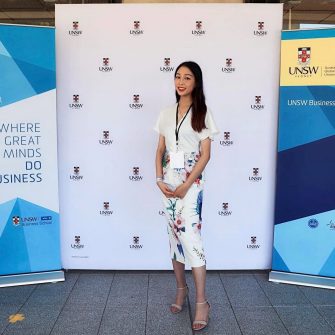Bachelor of Actuarial Studies / Commerce
- Commencing Terms
- Term 1, 2 & 3
- Duration
- 4 Year(s)
- Delivery Mode
- Face-to-face (includes blended)
- Campus
-
Kensington
- Codes
- UAC code 424350
- Program code 3155
- CRICOS code 080469M
-
2024 Indicative first year full fee
- $13,000*
-
2024 Indicative full fee to complete degree
- $56,500*
-
2024 Indicative first year full fee
- $52,000*
-
2024 Indicative full fee to complete degree
- $225,000*
- Overview
- Entry requirements
- What will I study?
- Future careers
- How to apply
- Fees & Scholarships
Overview
Do you like using maths to solve problems? Do you have a highly analytical mind? This double degree builds essential business knowledge in fields like finance or business analytics, combined with skilled mathematical analysis using statistics for excellent decision making. Graduate career-ready with professional experiences built into your studies. You can make big changes in the world with a career in business.
Key features
Two degrees in only four years
Gain professional accreditation as an actuary
Build a strong foundation in up to two business fields
Work experience opportunities embedded in the degree
Industry networking opportunities embedded in the degree
International work/study opportunities are also available
Why study this degree at UNSW?
UNSW Business School is ranked Australia's #1 Business School*. That means our business education leads the way in career impact, quality and reputation.
Our School of Risk and Actuarial Studies is ranked 1st Worldwide for Actuarial Studies Research**, meaning you will learn from leaders in the Actuarial Studies field. You will be trained to identify opportunities and adapt to challenges, in preparation for careers that may not even exist yet.
Get work experience with Career Accelerator, a portfolio of professional development opportunities that are exclusive to UNSW Business School students and embedded within our degrees. You’ll be able to build a professional network among more than 90,000 Business School alumni worldwide and begin your new career before graduation.
* QS Rankings by Subject 2024
** UNL Global Research Rankings of Actuarial Science 2023
Want to see more from UNSW Business School?
Entry requirements
The degree’s admission requirements are based on your Australian Tertiary Admission Rank (ATAR) or an equivalent rank derived from the following:
Australian interstate Year 12 qualifications (e.g., OP rank)
New Zealand NCEA Level 3
Equivalent overseas qualifications e.g., International Baccalaureate (IB) Diploma, GCE A-Levels
Post-secondary or tertiary qualifications
An alternative entry qualification
-
- The 2023 Lowest Selection Rank (LSR) is the adjusted rank (ATAR plus adjustment factors) you would have needed to gain entry to this degree in 2023.
- The 2023 A levels score is based on four Advanced Level (A2) subject. Entry scores are calculated from the best three or four A2 subjects (excluding repeated subjects) using the following values: A*=6, A=5, B=4, C=3, D=2, E=1. At most one Applied A Level subject may be included in the best four subjects used to calculate the aggregate.
- The 2023 IB Diploma is an indication of the IB you would have needed to gain entry to this degree in 2023. It is to be used as a guide only.
- The 2023 Lowest ATAR is the lowest ATAR (before adjustment factors were applied) to which an offer was made. Where <5 is listed, this indicates that less than 5 ATAR-based offers were made and so the score has not been published. N/A indicates no offers were made on the basis of ATAR.
-
At UNSW, we are committed to ensuring prospective students have all the information they need in order to make informed decisions about their study options.
To assist you in gaining a better understanding of how Admissions works at UNSW, we have provided you with a summary of ATAR offers and the student profile.
We hope this information will help you identify the degree that is right for you.
Assumed knowledge
Mathematics Extension 1
Adjustment Factors
We offer a range of adjustment factor schemes that reward students for academic performance and extra-curricular achievements. These schemes also take into account a range of personal and educational disadvantages that may have affected your studies.
HSC Plus
This scheme rewards students who perform well in Year 12 subjects that are relevant to their preferred UNSW degree. You may be awarded up to five points.
Elite Athletes, Performers and Leaders (EAPL)
This program recognises achievements in the areas of sport, academia, leadership and music at an elite level. You may be eligible for up to five points.
Educational Access Scheme (EAS)
Factors such as illness, financial hardship, language difficulties or attending a particular school can mean you don't always get the best possible marks in Years 11 and 12. If one of these situations applies to you, submit an application for the Educational Access Scheme (EAS) via UAC. Eligible students can receive between 1 and 10 points towards their chosen UNSW degree.
Admission pathways
Your ATAR is not the only measure of your potential to succeed, which is why we offer a range of pathways into university. Explore your options below and get in touch with our future student advisors to discuss your path to UNSW.
Gateway Admission Pathway
This scheme is open to students in Years 11 and 12 who attend Gateway schools. It significantly adjusts the ATAR requirements for your preferred UNSW degree and provides you with an early conditional offer to UNSW.
Entry programs for Australian Aboriginal and Torres Strait Islander people
We offer entry programs for Indigenous Australians, including the Indigenous Preparatory Programs and the Indigenous Admission Scheme (IAS). The entry pathway program you apply for will depend on the degree you want to study.
English language requirements
You may be asked to provide evidence of your English proficiency to study at UNSW depending on your educational background and citizenship. English language skills are vitally important for coping with lectures, tutorials, assignments and examinations - this is why UNSW requires a minimum English language competency for enrolment.
If you’re completing an Australian Year 12 qualification (e.g. NSW HSC or equivalent), you do not need to provide anything extra to prove your proficiency. Your qualification will be used as evidence of your English proficiency.
If you do need to provide evidence of your English proficiency, this will be indicated in your application. You can prove this by providing evidence that you meet one or more of the following criteria:
- English language tests and university English courses
- Prior study in the medium of English
- Other qualifications
If you need to improve your English skills before you start your degree, UNSW College’s Academic English Programs are for you. The programs are suitable for various English levels and help you prepare for university studies and life in Australia.
International direct entry
We do not accept secondary qualifications from this country. We may accept tertiary study results, please contact us for more information.
Please contact us for direct entry requirements.
Admission pathways
If you do not meet the requirements for direct entry into your chosen degree, you may be eligible for a pathway program with UNSW College. UNSW College provides alternative entry options using university-approved content so that you can start your UNSW journey with confidence.
English language requirements
You may be asked to provide evidence of your English proficiency to study at UNSW depending on whether you are from an English-speaking background or non-English speaking background. English language skills are vitally important for coping with lectures, tutorials, assignments and examinations - this is why UNSW requires a minimum English language competency for enrolment.
If English is not your first language, you’ll need to provide proof of your English proficiency before you can be given an offer to study at UNSW. You can do this by providing evidence that you meet one or more of the following criteria:
- English language tests and university English courses
- Prior study in the medium of English
- Other qualifications
If you need to improve your English skills before you start your degree, UNSW College’s Academic English Programs are for you. The programs are suitable for various English levels and help you prepare for university studies and life in Australia.
Check the specific English language requirements for this program
Program structure
The Bachelor of Actuarial Studies/Commerce is a four-year double degree program consisting of 32 courses.
The program includes:
- Actuarial Studies core courses
- Level 3 Actuarial Studies elective courses
- Optional Actuarial Studies major
- Commerce Integrated First Year courses
- One Commerce major
- Business School electives*
- General education courses from other faculties
*You can use Business School electives to complete a third major from approved areas of study.
Professional development courses and experiences:
Mandatory Work Integrated Learning – You must complete at least one course credit with a work integrated learning focus such as an internship or business practicum
Final Year Synthesis – Synthesise your learning by applying and integrating the knowledge and skills gained throughout your Bachelor of Commerce (BCom)
COMM3999 myBCom Graduate Portfolio
Study areas
Full program structure
You’ll complete a Commerce major and the Actuarial Studies major. A Commerce major is usually eight courses within one discipline. The Actuarial Studies major has 12 core courses. The remaining 16 courses are a mix of business core courses and electives and professional development.
Some courses need to be studied in your first and second year, so you’re prepared for courses that can only be studied in later years. Your study options are full-time or part-time. Each university year has three terms and an optional summer study period. Depending on how you plan your study load, you can fit two or three courses into a term and one course in a summer term.
Below is an example of what you could study in four years full-time.
First year
- MyBCom Blueprint*
- MyBCom First Year Portfolio* ^
- 4 Integrated First-Year Commerce courses
- 4 Level 1 Actuarial Studies core courses
Second Year
4 Integrated First-Year Commerce courses
2 Level 1 Actuarial Studies core courses
2 Level 2 Actuarial Studies core courses
Third Year
Work-Integrated Learning internship or practicum**
3 Commerce courses in your chosen Major
1 Level 2 Actuarial Studies core courses
3 Level 3 Actuarial Studies core courses
Fourth Year
MyBCom Graduation Portfolio*
Final Year Synthesis
4 Commerce courses in your chosen Major
2 Commerce elective courses
1 Level 3 Actuarial Studies core course
*Bachelor of Commerce credit-free courses dedicated to career planning and employability.
^Pre-requisite: COMM0999 AND completed 30 UOC of Integrated First Year Courses
**Mandatory work experience for course credit.
Future careers
The combination of business knowledge and actuarial analysis skills is highly sought-after and opens up many interesting career opportunities related to superannuation, risk management, financial services. Find yourself in analytical roles in any industry, including government, non-government organisations, start-ups and private enterprise. UNSW Business School's Career Accelerator provides work experiences and professional development opportunities to help get you started.
Potential careers
- Accountant/Auditor
- Actuarial Analyst
- Asset Management Trainee
- Business Analyst
- Business Consultant
- Credit Analyst
- Cyber Security Analyst
- Customer Experience Officer
- Data Analyst
- Digital Innovation Officer
- Economist
- Financial Adviser
- Human Resource Consultant
- Insurance Analyst
- Investment Banker
- Marketing/Brand Manager
- Risk Assessment Officer
- Superannuation Adviser
- Strategist
- Tax Adviser
- Wealth Management Analyst
Honours
Take your Actuarial Studies knowledge to the next level with an additional one-year Honours degree, where you'll gain advanced knowledge and research skills in your chosen area of business. You'll have the opportunity to be mentored by top-tier researchers and work on industry relevant projects while undertaking a significant research thesis. Graduate with advanced knowledge, analytical, problem-solving and research skills that are highly sought after in business and government. Learn more about Actuarial Studies Honours.
Accreditation
The Bachelor of Actuarial Studies provides a strong foundation for becoming an actuary or working within a related field. You can earn exemptions from the Actuaries Institute’s Foundation Program in Australia or VEE credit from the Society of Actuaries (USA).
The Bachelor of Commerce can give you professional recognition and accreditation in industry governing bodies, including the Australian Human Resources Institute, Australian Securities and Investment Commission, CPA Australia, Chartered Accountants Australia and New Zealand, ACCA, Financial Adviser Standards and Ethics Authority (FASEA) and Institute of Public Accountants.
How to apply
Applications for undergraduate study from domestic students (Australian citizens, Australian permanent residents, Australian permanent humanitarian visa holders and New Zealand citizens) are processed by the Universities Admissions Centre (UAC).
Visit the Apply section of the UAC website and you can nominate up to five degrees in order of preference, with the first being your most desired degree and university.
On-time applications for admission usually close at the end of September each year for Term 1 admission. Late applications can be submitted, but a late fee will apply. For study starting in Term 1, the majority of offers are made in December and January. Visit the UAC website for key dates for admission outside of Term 1.
Ready to apply?
For most international students, applications are submitted via our Apply Online service. We encourage you to submit your completed application as early as possible to ensure it will be processed in time for your preferred term.
Some high-demand programs with limited places, may have an earlier application deadline or may have an earlier commencement date. For more information visit our international applicant information page.
*If you are an international student studying an Australian qualification, go to the Universities Admission Centre (UAC) for application and UAC key dates. Note: If you are under 18 years of age, you need to make special arrangements. Read more.
Ready to apply?
Fees & Scholarships
Commonwealth Supported Place multiple Student Contribution Bands may apply for this double degree. See single degrees for the applicable fee bands.*The student contribution for a Commonwealth Supported Place is an indication only of the amount payable in Year 1 based on a standard full-time load of 48 credit points (1.0 EFTSL). The actual student contribution you will be liable for depends on your individual program of study and the calendar year in which you enrol. Actual fees are calculated upon enrolment. Student contribution amounts are subject to annual review by the University and may increase each year during your studies (subject to caps determined by the Australian Government), effective at the start of each calendar year. The indicative fees listed here are based on an estimated average and are for tuition only other fees and charges are not included.
*Fees are subject to annual review by the University and may increase annually, with the new fees effective from the start of each calendar year. The indicative fees listed here are based on an estimated average and are for tuition only other fees and charges are not included. The amount you pay will vary depending on the calendar year to enrol, the courses you select and whether your study load is more or less than 1 Equivalent Full Time Student Load (8 courses per year).
Indicative fees are a guide for comparison only based on current conditions and available data. You should not rely on indicative fees. More information on fees can be found at the UNSW fees website.
Indicative fees to complete the program have been calculated based on a percentage increase for every year of the program. Fee increases are assessed annually and may exceed the indicative figures listed here.
Indicative fees to complete the program include tuition plus an estimate of study-related costs of approximately $1,000 per year. To find out more about other costs, visit UNSW International.
Scholarships
At UNSW, we award over $83 million in scholarships each year. We pride ourselves on rewarding excellence and making university accessible to students from all walks of life. Whether you’re a domestic or international student, our range of scholarships, prizes and awards can support your journey.
-
Top 20Worldwide
QS World University Rankings, 2024.
-
MostEmployable Graduates
AFR Top 100 Future leaders Award.
-
LeadingInnovation
#1 Australian uni attended by start-up founders.








